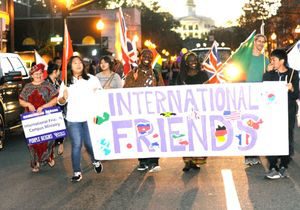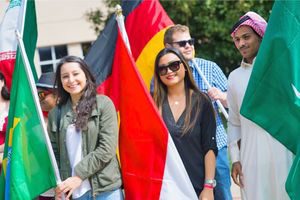
Photo courtesy of WCU.
This story was written by Quintin Ellison, originally published in The Sylva Herald.
Farzaneh Razzaghi returned last week from visiting her mother in Iran.
Soon after, President Donald Trump issued his immigration ban on Iran, Iraq, Syria, Sudan, Libya, Yemen and Somalia.
Though she holds U.S. citizenship, Razzaghi, dean of library services for Western Carolina University, said the Jan. 27 federal directive causes her discomfort “and some fear.”
“I don’t know, if I leave the country tomorrow, would they question me?” she said. “I’ve been a U.S. citizen for a long time, but my passport still indicates my place of birth.”
The Department of Homeland Security reported 348 people through 6 p.m. Sunday were not allowed to board airplanes flying into this country. Another 392 people holding green cards were admitted into the United States after the White House reversed its original decision to bar entry.
“It is sad to see people who went through the correct channels to come to the United States stopped,” Razzaghi said. “There is no country that does not want to be safe. But these people did not try to come here illegally.”
The president on Monday fired Acting Attorney General Sally Yates, an Obama-administration holdover, after she refused to enforce his order.
“It is time to get serious about protecting our country,” the White House said in a statement. “Calling for tougher vetting for individuals traveling from seven dangerous places is not extreme. It is reasonable and necessary to protect our country.”
‘Are you OK?’
Razzaghi said she’s been heartened by an outpouring of support, not only from members of the academic community, but from local residents. Other foreign-born WCU faculty report receiving similar assurances.
“That is the most beautiful thing about people in this country,” Razzaghi said. “And the kindest people are here. I’ve had so many emails asking, ‘Are you OK?’ I am so grateful.”
WCU administrators said they believe only a few faculty members would fall directly under the executive order.
“At this point, we have identified two graduate students from Iran, one faculty member from Iran and one faculty member from Libya,” WCU spokesperson Bill Studenc said. “In addition, we have an academic administrator who holds dual citizenship in the United States and Iran.”
Studenc said WCU collects information about faculty members with work visas. “It is possible that we have other faculty members who hold dual citizenship with the nations on the list,” he said. “In addition, there may be students who have spouses or other family members affected by the executive order.”
WCU will abide by federal and state laws prohibiting the release of confidential information about students, faculty or staff, Studenc said, adding that the university would look for additional guidance from University of North Carolina system leadership.
A fluid situation

Photo courtesy of WCU.
Katerina Spasovska, an assistant professor in WCU’s Communication Department, isn’t from one of the countries targeted.
“It is scary,” she said. “I came here from Macedonia because I wanted a stable political situation, democracy, a chance to make it on my own without relying on political connections or affiliations. I know what bad democracy looks like, and what Trump is doing, and how he is acting this first week, looks very much like the chaos from Macedonia.”
Obtaining the necessary clearance for her family required three years, she said, with WCU required to submit supplementary information.
“So when Trump says extreme vetting, I want to say the vetting is already extensive,” Spasovska said. “I don’t know what else they can do to make sure we are good enough to come to the United States. Test our values? Am I pro-life, do I go to church regularly? I feel like I don’t belong here because I don’t have an American passport, I don’t go to church and I talk other language in my home.”
Ling Gao LeBeau, a U.S. citizen born in China, is director of WCU’s Office of International Programs and Services. She oversees programs and services for international students and the study-abroad programs and travel courses.
“This is a friendly community, diverse and very supportive,” she said. “(But) I think this order makes a lot of immigrants uneasy and uncomfortable.”
LeBeau said the executive order triggered, for her, uneasy thoughts about federal action taken from 1882 to 1943 to curtail immigration from China to the United States.
“Some immigrants may applaud this order and think it’s the right thing to do,” she said. “Others lose confidence.”
A campus-wide email from Chancellor David Belcher sought to reassure nervous international students, faculty and staff, emphasizing WCU “values highly” their contributions.
WCU “is committed to being a welcoming and inclusive community for all,” the email said. “This is an unexpected, complex and fluid situation, and we are striving to provide support to those individuals and their families as things continue to evolve.”


